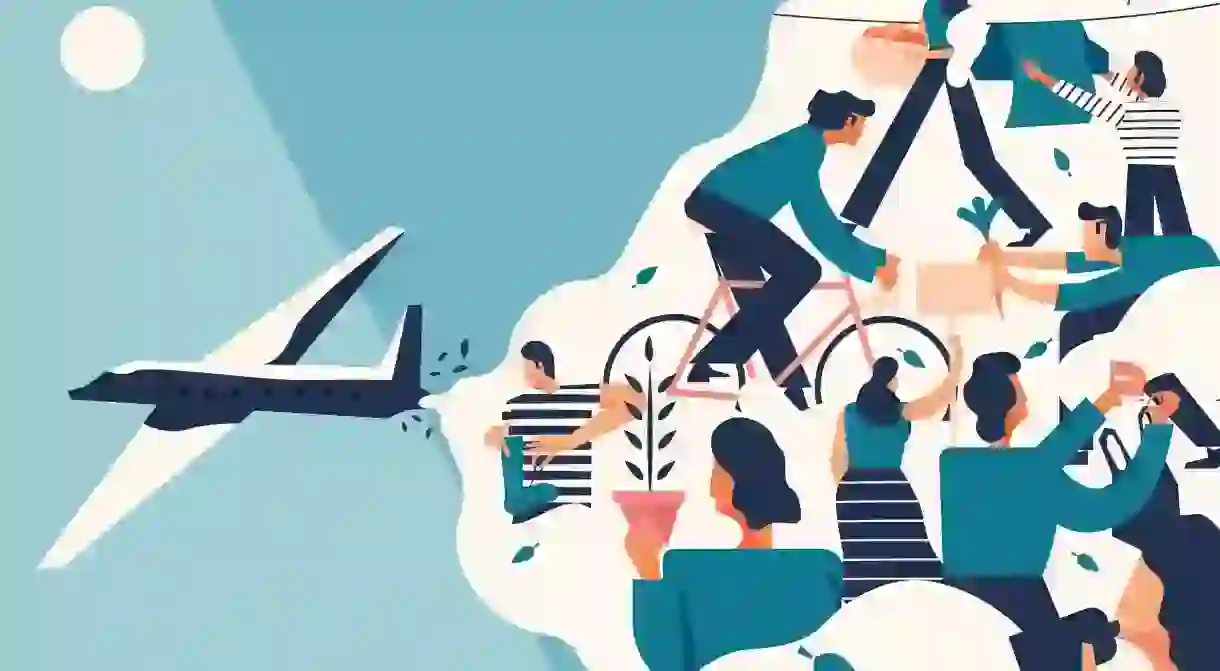How to Be a Thoughtful Traveller, Not a Tourist in 2018

More of us are set to travel in 2018 than ever before, but how can you see the world while limiting your impact on it? New technologies and reviving old approaches to travel may hold the answer.
As a travel editor, a big part of my job is getting out there and experiencing different cultures. I’m conscious of my carbon footprint and its effect on the accelerating degradation of the Earth’s natural resources and delicate ecosystems.
I’m also someone with an irrepressible desire to travel (maybe I have the explorer gene), and I’m all too aware that in today’s tumultuous times seeing the world has become an imperative not just a luxury, the best way to combat fake news and xenophobia.
A 2015 Nielsen study suggests sustainability is a key concern for most millennials. More generally, the search for sustainability is pushing us to adopt new travel habits.

At the same time, more of us are taking to the skies than ever before, with the number of air passengers expected to double within 20 years to an incredible 7.2 billion passengers.
Those of us who love travelling are travelling more, with most high-flying Britons now taking an average of eight holidays a year, according to the Association of British Travel Agents (2015). The impact of all this extra travel on our planet will be enormous.
Research from Lund University and the University of British Columbia last year revealed that avoiding one transatlantic flight per year is better for the environment than getting rid of your car. The study also found that one round trip to Australia is the equivalent of 20 years’ recycling and five years of eating a plant-based diet.
What other ways are there to limit the impact of travelling, while sating that wanderlust? Adopting a more thoughtful approach is not only better for the environment, but more rewarding too.
Six years ago, Ed Gillespie, founder of sustainability consultancy Futerra, spent 13 months circumnavigating the globe without flying – a kind of planes, trains and automobiles, only without the planes. His experience recounted in Only Planet: A Flight-Free Adventure Around the World (2014) questions our love affair with flying.
‘When you travel through the world rather than over it you discover the differences that unite rather than divide us,’ says Gillespie. ‘Travel used to be slow and sensual.’
‘When flying, you arrive feeling discombobulated,’ explains Gillespie. ‘When travelling by land you are exposed to every cultural nuance along the way.’ In his book Pattern Recognition (2002), American-Canadian author William Gibson uses the term ‘soul lag’ to describe the disconnect.

As everyday life speeds up, slowness is becoming a luxury. Train travel and road trips are having a renaissance. Taking the scenic route is increasingly preferred to getting from A to B as quickly as possible.
When the World Youth Student and Educational (WYSE) Travel Confederation surveyed more than 34,000 people from 137 countries, it found travellers are spending less time in ‘major gateway cities’, choosing hostels over hotels and going on long-term backpacking trips instead of two-week jaunts.
Ecotourism and eco hotels are two of the fastest growing sectors within travel, fuelled by an awareness of how tourism can have an adverse effect on historic cities and landscapes.
What started as a grassroots movement is fast becoming mainstream. Over a third (36%) of travellers plan on choosing more eco-friendly travel options and nearly two in five (39%) are interested in an eco-tour travel experience, according to Booking.com.
Far from taking only photographs and leaving only footprints, tourists can be careless with their rubbish when abroad. In Bali alone, 20,000 cubic metres of non-biodegradable waste gets left behind every day and locals face a constant battle to save their homes. The problem is so severe that a group of tween activists are campaigning to completely rid the island of plastic bags.
Monica Rosquillas is a blogger combining her love of travel with her passion for environmentalism. Her website Girl For a Clean World teaches followers how to combat consumerism and needless waste while travelling.

Her essentials include a water bottle, spork, reusable bag, stainless steel bento box, reusable napkin and insulated thermos. ‘Bringing just a few reusable items, I only have a handful of disposables at the end of each trip,’ she says.
Rosquillas finds that travel is a way to talk about environmentalism without alienating people, captivating new audiences with beguiling images of waterfalls and volcanoes.
‘Young people are bombarded with marketing for things that they don’t need. You can counter those with messages about being a better environmental steward in all facets of life,’ she says.
Thoughtful travel for 2018 is also about local communities taking ownership for what happens in their neighbourhoods. Like a kind of environmental broken window theory, if tourists see waste they’ll be more inclined to leave their own.
Claire Sancelot is an entrepreneur whose bulk whole foods business The Hive is turning heads and changing attitudes in Kuala Lumpur, Malaysia.
‘The waste is much more in your face in South Asia, beaches are like landfills,’ she says. ‘Now we’ve been here for a year people are coming with their containers and starting to be more conscious about they way they shop.’
‘We need to keep making it easier for companies to make money by doing the right thing,’ says Mark Stevenson, founder of Atlas of the Future, a National Geographic for the new and next. ‘We’ve become fed up with being consumers, we want more of an active choice.’
From avoiding aeroplanes where possible and embracing slow travel to being a zero-waste warrior and actively seeking out businesses that help you reduce your impact, 2018 is all about making that extra effort when visiting the places you love so that future generations may enjoy them too.













